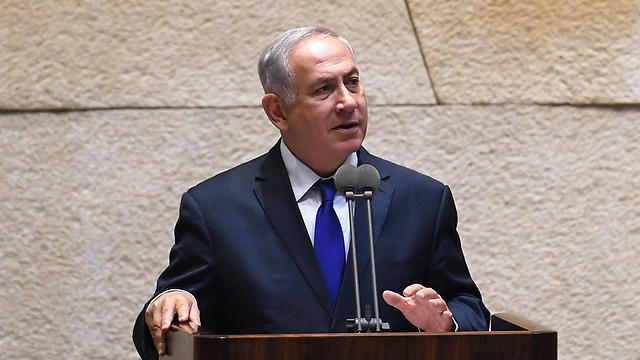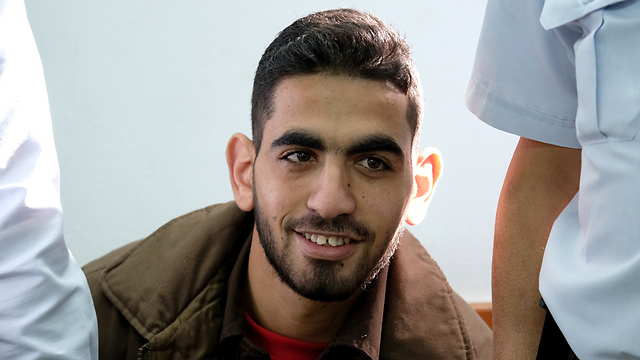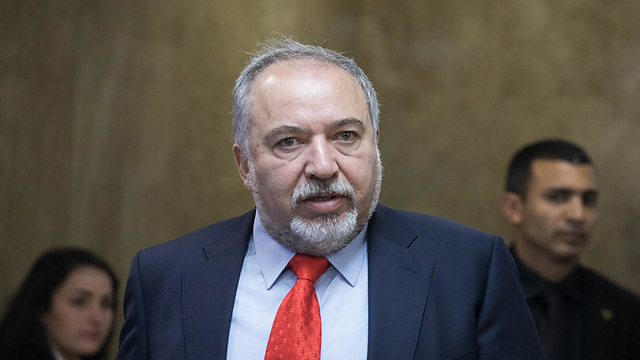
Knesset moves to ease restrictions on death penalty for terrorists
Controversial legislation spearheaded by Lieberman that would ease imposition of capital punishment for terrorists narrowly passes preliminary Knesset reading, garnering 51 votes for, and 49 against; PM: 'Whoever holds a knife, murders and laughs deserves to die. He doesn't deserve to live.'
Fifty-two members of the Knesset voted in favor of the bill that has become a pet piece of legislation for Lieberman and his Yisrael Beytenu party, while 49 voted to toss it out.
Today military courts are authorized to impose the death penalty on convicted terrorists on condition that the decision is unanimously taken by the panel of judges.
The new legislation however seeks significantly moderate the criteria by granting authorization to a simple majority of a military court panel, while simultaneously extending the jurisdiction over the matter into the realm of civilian courts and making it impossible to commute a death penalty that was pronounced in a final verdict.
Addressing the Knesset plenum, Prime Minister Benjamin Netanyahu said he backed the rationale behind the bill.
"Whoever holds a knife, murders and laughs deserves to die. He doesn't deserve to live," Netanyahu said, referring to the slaughter of the Salomon family in Halamish.
"The family members who survived the terrible attack told me how the terrorist grabbed the knife, slaughtered and laughed. I've seen some shocking things in my life, but that shook me to my core.
"There are extreme situations of people who commit terrible crimes and therefore do not deserve to live, they deserve the full amount of punishment. We support a change in the law for these situations, and especially on the ability to make a decision not under the guidance of the government or the defense minister, but on the basis of the opinion of two out of three judges. This is the main change we are interested in."
According to him, "the death penalty as justice in an extreme situation has already been tested in the State of Israel. No one here is reckless, when you think of the very difficult and extreme things we experienced, this is required at least in a preliminary reading. Then we can consider it further at a later time."
MK Ahmad Tibi (Joint List), who headed the discussion in the plenum, implied to the bill's supposed discriminatory nature, asking the prime minister whether he would support the application of the bill in cases of Jewish terrorists as well.
"Is the case in Duma an extreme case in which you support the death penalty?" he asked, referring to the firebombing of the Dawabsheh family.
Not missing a beat, Netanyahu replied: "In principle, yes."
The bill was brought before the Knesset despite objections raised in the ruling Likud party.
"It's the worst thing Israel can do to itself," Energy Minister Yuval Steinitz said during a government meeting earlier on the controversial legislation. "The damage to the State of Israel could be massive. We're playing into the hands of our worst enemies.”
A statement by Lieberman explaining the bill said that it was essential in the fight against terror. “The struggle against terror is the greatest challenge facing the world and especially Israel in the 21st century,” the statement said.
“However, there is a huge gap in the way Israel operates on punishment and the reality it faces. The release of terrorists after a time in prison that has not been completed, including terrorists who have carried out the most horrific attacks, is the wrong message that does not contribute to the struggle against terror and Israel’s deterrence capabilites."
In cabinet meetings, all the heads of the defense establishment presented an unequivocal stand against the death penalty, including the Shin Bet chief, the head of Military Intelligence, the IDF chief of staff and the police commissioner.
The Shin Bet explained their opposition by stressing that such a law could lead to kidnappings for bargaining between Israelis and Jews, and does not deter individual terrorism and will not deter suicide bombers who are willing to sacrifice their lives anyway.
Last month, Attorney General Avichai Mandelblit clarified that he also opposes the legislative initiative.
According to the Mandelblit, the bill is inconsistent with the state's declarations regarding the death penalty in international forums and with the position of the UN Human Rights Committee on Israel—and is expected to provoke criticism in the international arena.
Indeed, such criticism has already come. The European Union embassy in Israel condemned the bill, saying that "the death penalty is contrary to human dignity. It constitutes inhuman and degrading punishment. It has no proven deterrent effect and may allow a situation in which legal errors can be irreversible and cause a fatal result."














